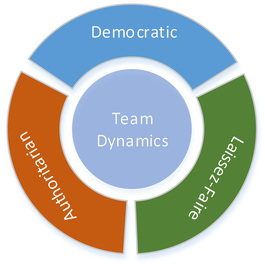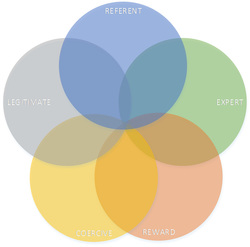As George E.P. Box has said, “All models are wrong, but some are useful.” This is how we should view the many models available that attempt to illustrate the different styles of leadership that exist. There is, perhaps, no model that can completely and accurately describe all the ways leaders interact with and influence those around them. However, models can be useful in giving us a reference by which we can objectively examine important aspects of leadership and provide a basis upon which we can grow and develop our own style.
In this article, we will examine Kurt Lewin’s Three Leadership Styles and French and Raven’s Five Bases of Power. Lewin’s Leadership Styles describe the various styles of organizations that leaders build, while the Bases of Power describe the methods, capability, and tools that a leader uses to influence his/her team to build that organization. What we want our organization to look like and what drivers we have to get it there – these are the two dimensions that leaders need to consider when shaping an organization.
Three Styles of Leadership

Kurt Lewin asserts that there are three general leadership styles:
Authoritarian – In this type of organization, the leader makes all the decisions without input from the team members. The team is generally in the dark about future plans. The leader can certainly be viewed as friendly and personal – this style does not imply that the leader is openly hostile.
Democratic – In a democratic organization, the leader welcomes team input and facilitates discussions. Plans are shared with the team with multiple options available for the future. Team members are encouraged to work with one another and provided freedom to define the division of tasks among the team. Studies have shown that groups using democratic systems tended to be less productive than authoritative systems, but the work output was of much higher quality.
Laissez-Faire – This model stresses complete freedom among the team members in decision-making. The leader provides work materials and only participates upon request of the team. In general, this model has only been shown to generate success in teams of very highly qualified experts, otherwise it has been found to result in poorly defined roles and frustration from within the team.
It is tempting to place value judgment over each of the styles. In fact, many leaders experience challenges, particularly early in their career, by assuming that a particular style of leadership is “better” than others. The successful leader will develop an awareness of the team dynamics and emphasize leadership styles that are appropriate to the evolving needs of the organization.
Five Bases of Power
 John French and Bertram Raven provide the following five bases of power by which a leader influences their team:
John French and Bertram Raven provide the following five bases of power by which a leader influences their team:
Coercive – This power is founded in the leader’s ability to force a team member into compliance through the threat of punishment. Though this power can be very useful for short-term compliance in situations where the organization is threatened for survival, overuse leads to long-term dysfunctional behavior and withdrawal.
Legitimate – This power is founded completely in the belief among team members that the leader has the right to give orders based on the leader’s position. The effectiveness of this power relies very heavily on the stability of the authority hierarchy within the organization. Though legitimate power will result in compliance, it does not necessarily come with commitment or cooperation.
Reward – This power is founded in the ability of the leader to provide or deny either tangible or intangible rewards to the team members. Though reward systems are generally very positive, an overdependence on it can result in team members losing focus on the job and instead on the reward system. In extreme cases, team members may be tempted to unethically or illegally perform their work to meet the quotas required for reward.
Referent – This power is derived from the respect a team has for their leader and the desire to identify with or emulate him/her. The faith a leader builds will tend to see the team members make decisions presuming what their leader would do in a similar situation as a point of reference. This form of power places a heavy responsibility on the leader to maintain the relationship. Also, this form of power is the most difficult for an organization to scale.
Expert – This power is founded in the belief that the leader has a high level of knowledge or specialized skill set. Purely speaking, when the leader shares knowledge, this power is reduced. As a result, a leader with expert power will lose the authority of this power over time as he/she shares knowledge. If the leader intentionally chooses to withhold knowledge to preserve this power, the organization will lose effectiveness over time.
It is tempting to place value judgments on each of the organization types and bases of power. The reality is that, when applied effectively and responsibly, all of these can be employed to deal with the ever shifting dynamics of a team. An exceptional leader is one who can properly identify the needs of the organization and apply his/her influence effectively.










